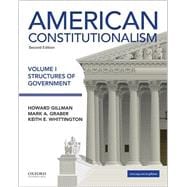In American Constitutionalism, Second Edition, renowned authors Howard Gillman, Mark A. Graber, and Keith E. Whittington offer an innovative approach to the two-semester Constitutional Law sequence (Volume 1 covers Institutions and Volume II covers Rights and Liberties) that presents the material in a historical organization within each volume, as opposed to the typical issues-based organization. Looking at Supreme Court decisions historically provides an opportunity for instructors to teach--and students to reflect on--the political factions and climate of the day. The second edition has been streamlined and also features updated cases, analysis, illustrations, and figures.
FEATURES
Covers all important debates in U.S. constitutionalism, organized by historical era
Clearly lays out the political and legal contexts in chapter introductions
Integrates more documents and cases than any other text on the market, including decisions made by elected officials and state courts
Offers numerous pedagogical features, including topical sections within each historical chapter, bulleted lists of major developments, explanatory headnotes for the readings, questions on court cases, illustrations and political cartoons, tables, and suggested readings
Additional material previously available in the first edition is now located on the book's free, open-access Companion Website at www.oup.com/us/gillman








